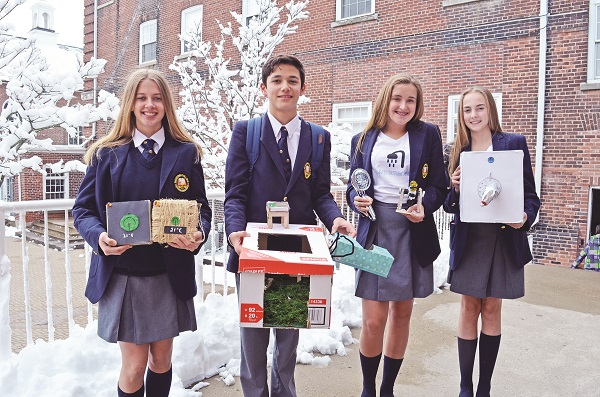General News » News
Students brainstorm paths to a more sustainable future
April 12, 2017 · 0 Comments

By Brock Weir
In those dark winter mornings that are behind us for another few months, nobody likes to come to work or school to a freezing office or classroom.
We like to keep the heat on, not only for our own comfort, but to also make sure our pipes and other amenities don’t fall victim to the cold.
Chances are, however, we usually overdo it. Luckily, there’s an app for that…or there will be soon if students like Aurora’s Grace Robinson has her way.
Grace and her teammates took home top honours on Friday when they stepped into the den to pitch to the Pumas – Pickering College’s own version of Dragon’s Den – with their product “Censor Makes Sense.”
A Grade 9 student in Pickering College’s Global Leadership Program, Grace and her teammates developed a concept for an app to save energy that is all too often wasted in homes, schools, and office spaces. Their motion-sensor concept won the confidence of the Pumas, comprised of Pickering College alumni and parents.
“It took a lot of experimenting with this particular idea,” says Grace. “We were originally just going to hook it up to any kind of energy system, whether it is lights or anything else that runs on electricity and then we saw a lot of energy is wasted just in heating or cooling alone but we decided to just focus on that and start off with that idea.
“At Pickering College, we realized we weren’t using much of the heating and cooling in classrooms, but it was still on at night because when you come in in the morning you don’t want it to be freezing. We figured we could set it to your desirable heat and turn it down. Just a few degrees will make quite a bit of difference.”
Friday’s session in the Puma’s Den was an all-day affair as Aurora students Meghan Beswick and Josie Hadden joined their fellow brains behind Aquamarine Showerheads to make their own pitch.
Their concept is a shower head that not only conserves water but generates its own electricity which, including the electrical generator, would run consumers $150.
“We knew right off the bat we wanted to do something with water and technology,” says Meghan. “We ended up with a very long process with different ideas on what a shower head should be and how we can make our showerhead save water. It was a topic we could all relate to and it was something that could also be implemented in our school, which is important.”
They kicked around several different ideas, including a concept that would include beeping indicators on how much water you had used and Bluetooth technology enabling you to listen to your favourite tunes while you scrub up.
“After some research we finally realized that we should not have the Bluetooth so close to water!” laughs Josie. “That would not mix well if something went wrong – and the beeping was not very relaxing, and most people like tranquil showers. We realized that a lot of people like simple showers. They don’t want too many buttons to press or too much to do. They like it simple and straightforward.”
Simple and straightforward was not on the radar for Aurora student Aiden Suen, whose team took things to the next level with not only a product but a complete system to revolutionize how we use waste.
“Our idea was a biomass energy generator that makes use of every single ingredient that is wasted,” he says. “When you burn methane it produces carbon dioxide. We would use that carbon dioxide for our greenhouse to enhance the growth of plants so we could recreate food waste. My group and I discovered that food waste is constantly being produced at Pickering College because there is boarding and there is lunch and dinner. When we collect it we don’t do anything with it, so you might as well put it to use.”
Over the course of the fun day of pitching their ideas, the young innovators took away plenty of valuable feedback which will stand them in good stead well into the future. Among them, they said, was always knowing your cost, your market, and why your product is unique on the market. You should always know how much you want to get out of the Dragons – or Pumas – and just how you’re going to put the money to good use.
For teacher, Julia Hunt, Director of the Global Leadership Program, however, it was a matter of tackling real world problems.
“For us, as a school, every year we get closer and closer to somebody inventing something we can actually produce,” she said. “I think all the groups represented here have very good ideas of something that could actually be done. One day, not too many years down the road, there is going to be a Pickering College student who is actually going to invent something that is going to go to market and getting closer and closer [to that point] is very exciting for us.
“Sustainability is a real world problem and maybe a couple of you in this Grade 9class, something will stick with you, especially when you get to university or your first job and you want to go back to that idea. ‘I really think we actually had something there. I am a little bit older and I think we could actually bring this to market.’”











